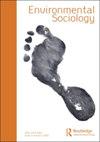When water policies derail livelihood aspirations: farmers’ agency in everyday politics in the Vietnamese Mekong Delta
IF 2.4
Q3 ENVIRONMENTAL STUDIES
引用次数: 1
Abstract
ABSTRACT Development of water infrastructure is conventionally prioritised as a pre-emptive intervention policy to address water challenges. In the Vietnamese Mekong Delta, turning a river into a reservoir is touted as a ‘highly-modernist’ water management approach to secure the year-round supply of freshwater for agricultural production. This paper investigates how contested water-livelihood relations emerged from the building of the Ba Lai sluice scheme in Ben Tre Province, and how these processes demonstrate farmers’ agency in everyday politics in seeking solutions for livelihood sustainability. Drawing on a qualitative case study in Binh Dai District, we argue that, while the scheme successfully fulfils the state’s political intention in securing water supply for freshwater-based crop production in coastal zones, it generates contestation between the local government’s attempts to enforce freshwater policies and farmers’ agency in maintaining productive livelihoods. The findings suggest that power asymmetries are embedded within these water-livelihood relations. We find that seeking just solutions that have co-benefits for water management and livelihood sustainability should go beyond business-as-usual water politics by adequately recognising the agency of farmers in sustainable development. The case study offers lessons for navigating the sustainable future of water development projects in coastal deltas and beyond.当水利政策破坏生计愿望时:越南湄公河三角洲农民在日常政治中的作用
ABSTRACT 水资源基础设施的开发通常被视为应对水资源挑战的先发制人的干预政策。在越南湄公河三角洲,将河流变成水库被视为一种 "高度现代主义 "的水资源管理方法,可确保全年为农业生产提供淡水。本文研究了在檳椥省興建巴萊水閘計劃過程中,如何出現有爭議的水與生計的關係,以及這些過程如何展示農民在日常政治中尋求生計永續解決方案的能動性。通过对 Binh Dai 县的定性案例研究,我们认为,虽然该计划成功地实现了国家的政治意图,为沿海地区以淡水为基础的作物生产提供了水源保障,但它在当地政府试图执行淡水政策与农民维持生产性生计的能动性之间引发了争论。研究结果表明,在这些水-生计关系中存在着权力不对称。我们发现,在寻求对水资源管理和生计可持续性具有共同利益的公正解决方案时,应充分认识到农民在可持续发展中的能动性,从而超越一切照旧的水资源政治。本案例研究为沿海三角洲及其他地区的水开发项目的可持续发展提供了借鉴。
本文章由计算机程序翻译,如有差异,请以英文原文为准。
求助全文
约1分钟内获得全文
求助全文
来源期刊

Environmental Sociology
ENVIRONMENTAL STUDIES-
CiteScore
4.60
自引率
12.00%
发文量
34
期刊介绍:
Environmental Sociology is dedicated to applying and advancing the sociological imagination in relation to a wide variety of environmental challenges, controversies and issues, at every level from the global to local, from ‘world culture’ to diverse local perspectives. As an international, peer-reviewed scholarly journal, Environmental Sociology aims to stretch the conceptual and theoretical boundaries of both environmental and mainstream sociology, to highlight the relevance of sociological research for environmental policy and management, to disseminate the results of sociological research, and to engage in productive dialogue and debate with other disciplines in the social, natural and ecological sciences. Contributions may utilize a variety of theoretical orientations including, but not restricted to: critical theory, cultural sociology, ecofeminism, ecological modernization, environmental justice, organizational sociology, political ecology, political economy, post-colonial studies, risk theory, social psychology, science and technology studies, globalization, world-systems analysis, and so on. Cross- and transdisciplinary contributions are welcome where they demonstrate a novel attempt to understand social-ecological relationships in a manner that engages with the core concerns of sociology in social relationships, institutions, practices and processes. All methodological approaches in the environmental social sciences – qualitative, quantitative, integrative, spatial, policy analysis, etc. – are welcomed. Environmental Sociology welcomes high-quality submissions from scholars around the world.
 求助内容:
求助内容: 应助结果提醒方式:
应助结果提醒方式:


